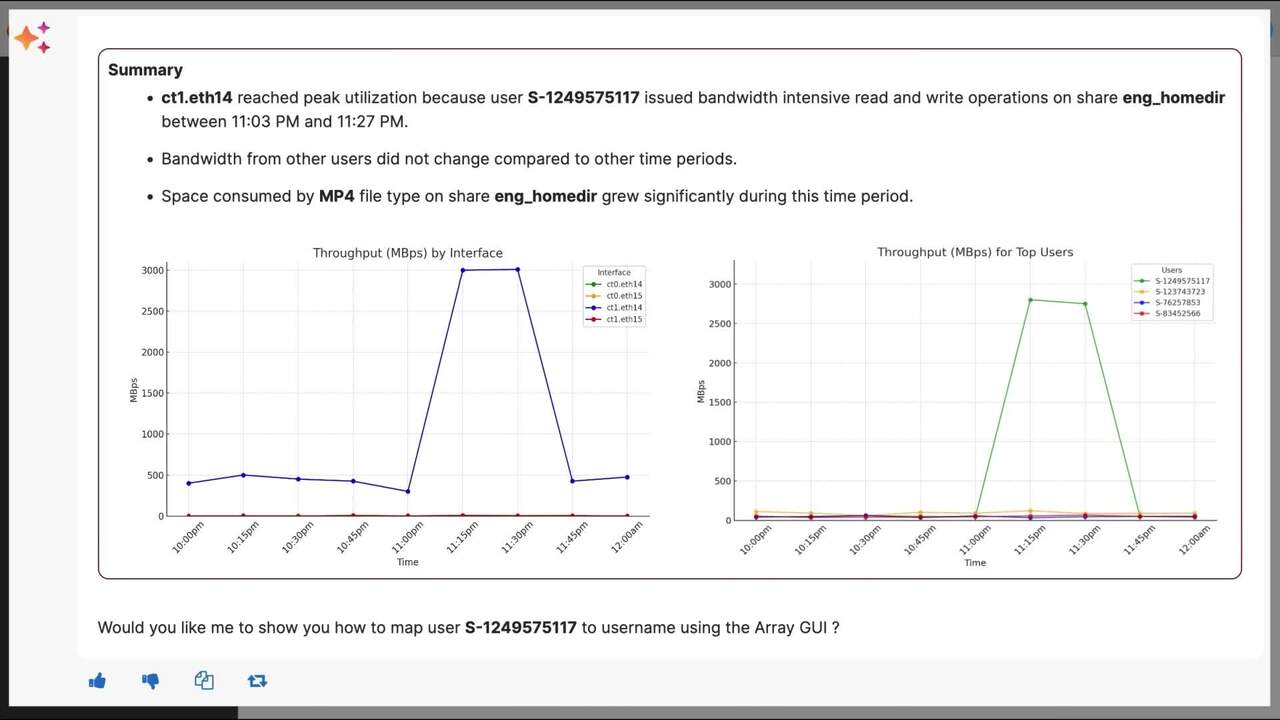Dismiss
Innovation
A platform built for AI
Unified, automated, and ready to turn data into intelligence.
Dismiss
June 16-18, Las Vegas
Pure//Accelerate® 2026
Discover how to unlock the true value of your data.
Dismiss
NVIDIA GTC San Jose 2026
Experience the Everpure difference at GTC
March 16-19 | Booth #935
San Jose McEnery Convention Center
3:45 Video
AI Copilot for Files
Simplify file storage management with AI Copilot.
Click to View Transcript
So, let's see how AI co-pilot simplifies your day to day, starting with a general health check. AI co-pilot quickly gives us a full report across several key areas security, capacity, performance, users, protocols, and virtual machines. It highlights where everything is running smoothly and flags potential issues.
In this case, performance, users, protocols, and virtual machines. Instead of manually checking multiple dashboards, AI co-pilot instantly brings everything together in one place. Now, let's dig into those flagged performance issues. AI co-pilot dives deeper, revealing that the issue occurred on a networking port on the
array, XL10 UK. This port reached peak utilization for nearly 25 minutes, which likely caused higher latencies for users accessing file shares, and co-pilot doesn't just identify the issue, it also brings us solutions. In this case, it suggests either adding another file interface to spread the load or using link
aggregation to combine multiple network interfaces for better performance. So let's ask it to tell us why the port reached peak utilization in the first place. Instead of searching through logs or relying on multiple teams to track down the cause, AI co-pilot shows that a single user performed bandwidth intensive read and write operations on an engineering file share during that time.
Meanwhile, the bandwidth usage from other users remains steady, meaning that this particular user likely caused the spike. It also detected that the space consumed by MP4 files grew significantly during this period, and while neither pure storage nor co-pilot has access to your actual data, this insight gathered from metadata like file types gives you a better understanding of how
your storage is being used. You also get visualizations showing the throughput by user and network interface, clearly pinpointing who and what caused the bottleneck. Now, let's ask it to investigate the protocol issues it pointed out earlier. And here's where AI co-pilot really shines.
It doesn't just look at storage, it highlights issues outside your array like misconfigurations in Active Directory or DNS. In this case, there were increased errors when trying to connect to our domain controllers from the array that would have impacted user access to SMB file shares. The root cause some domain controllers were unreachable and DNS returned them in an
unexpected order. But again, AI co-pilot offers clear recommendations. Either modify the DNS configuration to prioritize specific domain controllers or configure the array itself to prefer certain domain controllers. This saves you the hassle of coordinating with multiple teams to track down non storage
related issues. AI copilot quickly provides a solution, and you can move on to the next task. AI co-pilot doesn't just provide information, it turns data into action. From fleet health to user activity and even troubleshooting network and VM configurations, it's your assistant for managing and securing your storage and file services with ease.
With AI co-pilot, complex infrastructure management becomes simpler, more intuitive, and incredibly powerful, giving you more time to focus on what matters most to your organization.
Simplify file storage management with AI Copilot.
We Also Recommend...
Personalize for Me
